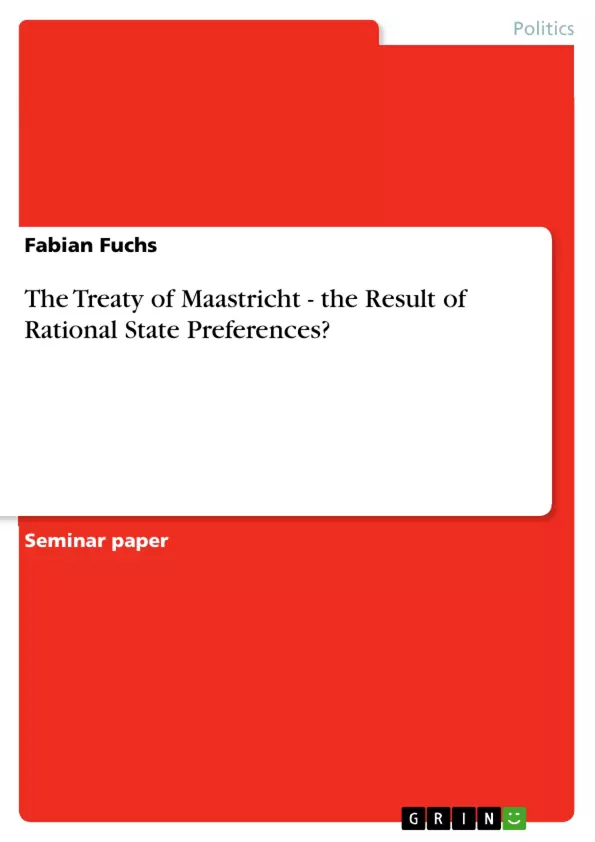The topic of this term paper deals with the Maastricht Treaty which came into force in November 1993 and created the European Union. I will examine in particular the negotiations between the member states of the EU, which led to the ratification of the treaty.
The reason for choosing this subject was on the one hand a presentation about the negotiations of the treaty and the integration theory which can explain best the results. I gave it within the scope of a seminar about European Integration during the summer term 2009. The Maastricht Treaty is, on the other hand, certainly a milestone of the European Integration and therefore an important and interesting topic to write about.
The research question is the following: is the Maastricht treaty a result of rational state preferences? Therefore I will analyze the negotiations with the integration theory of Liberal Intergovernementalism (in the following abbreviated “LI”) because the approach of LI is far better suitable to examine such a question than, for example, the theory of Neofunctionalism.
The term paper is divided in three parts: the first part is about the used integration theory, the LI. I will give a general explanation of the main features of this theory and about the theory
that states are acting in a rational manner.
The second section is the main part. This chapter has the focus on the negotiations of the Maastricht Treaty between the member states of the EG. The positions of three nations during these negotiations will be viewed: Germany, Great Britain and France. It is obviously that a consideration of all projects which were on the agenda of the negotiations would go beyond the scope of his work. Therefore I will focus my attention on the Economic and Monetary Union.
Within this project the negotiating positions of the states mentioned above will be analyzed in regard to find out if the individual positions are the outcome of rational state preferences.
The third and last part will be the conclusion. There I will give a summary of the results of the analysis undertaken in the main part and the research question will be answered.
Inhaltsverzeichnis (Table of Contents)
- Introduction
- The Liberal Intergovernementalism
- Negotiating positions concerning Economic and Monetary Union (EMU)
- Germany
- Great Britain
- France
- Points of criticism and other approaches
- Conclusion
Zielsetzung und Themenschwerpunkte (Objectives and Key Themes)
The term paper examines the Maastricht Treaty, which came into force in 1993 and established the European Union. Specifically, it analyzes the negotiations between member states leading to the treaty's ratification, using the Liberal Intergovernementalism (LI) theory to explain the process.
- The role of rational state preferences in the Maastricht Treaty negotiations
- The application of the Liberal Intergovernementalism theory to understand European integration
- The negotiation positions of key member states, particularly Germany, Great Britain, and France
- The significance of the Economic and Monetary Union (EMU) in the Maastricht Treaty negotiations
- The limitations of the LI theory and other alternative perspectives
Zusammenfassung der Kapitel (Chapter Summaries)
- Introduction: This chapter introduces the research question concerning the rational state preferences driving the Maastricht Treaty. It also presents the chosen theoretical framework, Liberal Intergovernementalism, and its relevance for analyzing the treaty negotiations.
- The Liberal Intergovernementalism: This chapter provides an overview of the LI theory, explaining its key elements, including the concept of rational state behavior and the three-stage "rationalist framework" - preference formation, interstate bargaining, and institutional choice.
- Negotiating positions concerning Economic and Monetary Union (EMU): This chapter focuses on the negotiation positions of Germany, Great Britain, and France regarding the EMU, analyzing whether these positions reflect rational state preferences within the LI framework. It explores the domestic pressures and interests influencing each state's stance in the negotiations.
Schlüsselwörter (Keywords)
The core concepts of this paper include the Maastricht Treaty, European Integration, Liberal Intergovernementalism, rational state preferences, Economic and Monetary Union, negotiation positions, and the roles of Germany, Great Britain, and France.
Frequently Asked Questions
What is the main research question regarding the Maastricht Treaty?
The paper investigates whether the Maastricht Treaty, which created the European Union, was the result of rational state preferences among its member states.
What is Liberal Intergovernmentalism (LI)?
LI is an integration theory that suggests states act rationally to protect their domestic interests through international bargaining and institutional choice.
Which countries' positions are analyzed in the paper?
The analysis focuses on the negotiating positions of the three major powers: Germany, Great Britain, and France.
How did the EMU influence the treaty negotiations?
The Economic and Monetary Union (EMU) was a central project where the rational preferences of states were most visible, reflecting their economic goals and domestic pressures.
Why is LI better suited than Neofunctionalism for this study?
Liberal Intergovernmentalism is considered more effective for analyzing state-led negotiations and the formation of national preferences compared to the supranational focus of Neofunctionalism.
- Quote paper
- Fabian Fuchs (Author), 2009, The Treaty of Maastricht - the Result of Rational State Preferences?, Munich, GRIN Verlag, https://www.grin.com/document/160048



